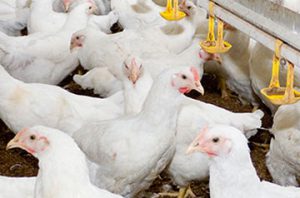Contributing to the management of the coccidiosis risk

Nor-Feed Natural Solutions against poultry coccidiosis
Coccidiosis is a disease caused by protozoan parasites, mainly from the Eimeria genus, generally located in the intestine. With the risk of becoming rapidly resistant to certain molecules, these parasites are transmitted by a highly infectious process (essentially via oral-fecal route). Present in all farming systems, coccidiosis is particularly harmful for young monogastric animals (poultry, young ruminants, piglets and rabbits) for which health consequences can be significant: loss of appetite, reduction of feed intake, enteritis, hemorrhagic diarrhea…
Coccidiosis has an extremely heavy economical impact
In the poultry industry, 98% of the farms use an anticoccidial solution, for an overall cost estimated at 800 million dollars in preventive treatments (Graff et al.; 1999; Williams, 1998). Coccidiosis represents a loss of 3 billion $/year for the poultry industry (thepoultrysite.com, 2013).
Coccidiosis prevention solutions in farms
The disease control is principally made through the use of synthetic coccidiostats of which a long-term and large scale use causes antimicrobial resistance (Long, 1982; Stephan et al., 1997; Yadav and Gupta, 2001; Arabkhazaeli et al. 2013). Plant-based feed additives represent interesting alternatives for all species.
Sources:
- Propositions pour une démarche d’évaluation de substances ou de produits « nouveaux » destinés à l’alimentation animale, Agence française de sécurité sanitaire des Aliments, Février 2007;
- Rapport de la Commission au Conseil et au Parlement Européen relatif à l’utilisation de coccidiostatiques et d’histomonostatiques en tant qu’additifs pour l’alimentation animale;
- CCE, Bruxelles, 2008.
